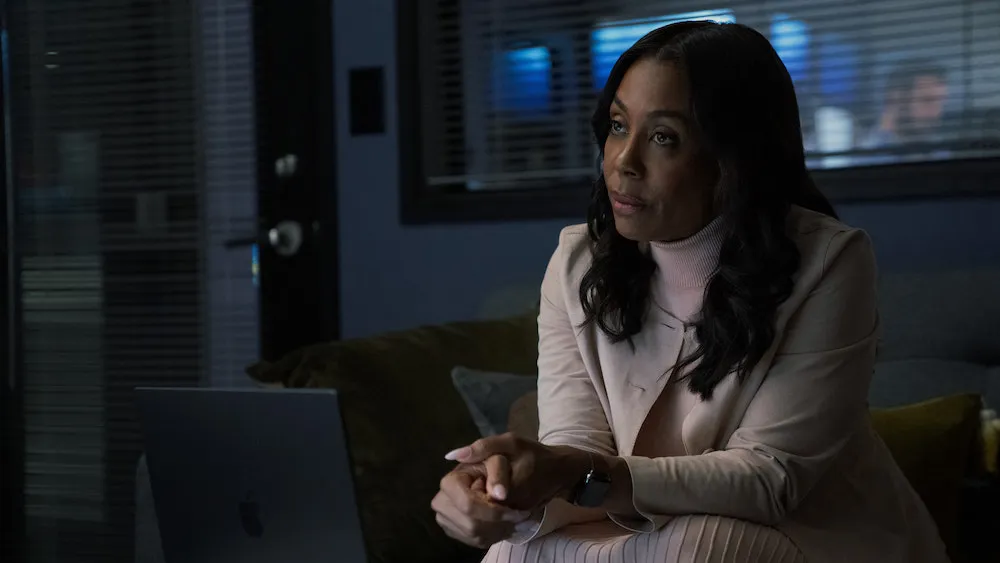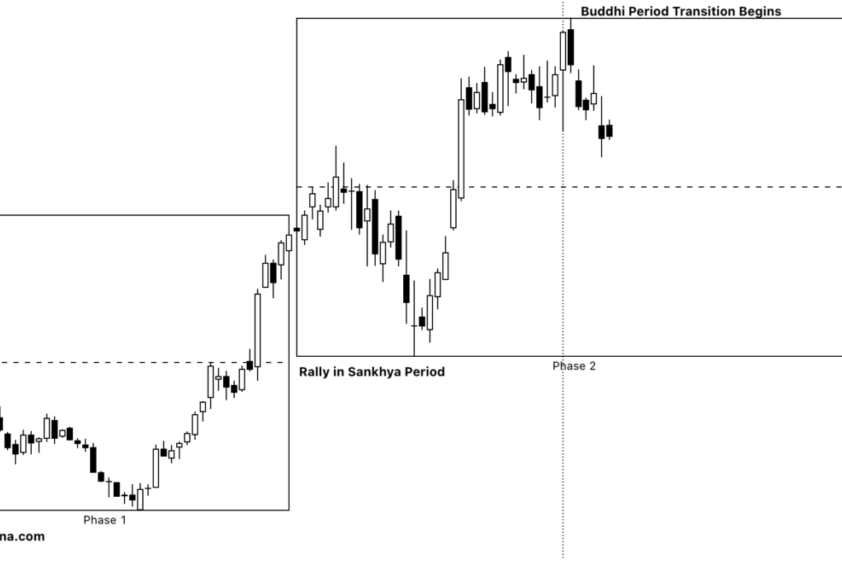
SPOILER ALERT! This post contains details from Episode 403 of Apple TV+‘s The Morning Show.
The Morning Show delivered a crushing blow to Karen Pittman‘s Mia Jordan in the third episode of Season 4, titled “Tipping Point.”
After years of vying for Head of News, Mia loses the role to Ben (William Jackson Harper), UBN’s new Head of Sports. During her interview for the role, which she believes to be a lock after years of promises from Stella (Greta Lee) about their shared vision for the future of the company, she’s challenged by Celine (Marion Cotillard), who believes that their news division isn’t “sexy” enough.
Even after delivering quite a moving speech about how the truth is the most incendiary story they could possibly tell at this moment, especially given that The Morning Show anchors itself in real-life current events and the current political climate, she still loses out on a job she’s spent her whole career preparing for. And little does she know, it’s all because Stella is being blackmailed into handing the job to Ben at Celine’s direction, otherwise Celine won’t approve Cory’s (Billy Crudup) production deal with UBN…and if she doesn’t, he’s going to tell Celine that Stella has been having an affair with her husband.
From this moment on, Season 4 will continue to explore “how incredibly painful and terrible that [moment] would be for these two women, who have been allies,” showrunner Charlotte Stoudt told Deadline. “We wanted to look at how they would both survive that. In a funny way, I think Stella’s miscalculation…ultimately clears a way for Mia, perhaps, to have more power than she might have if things had gone according to plan.”
The episode ends on an emotional note as Stella tells Mia she hasn’t been promoted, and Mia must contend with the idea that nobody at UBN seems to be looking out for her…except for her. In the final moments of the episode, Mia quits, leaving many questions about her journey in the remainder of the season.
“We also just thought it was fun for Mia to discover what we’ve all known forever, which is she’s just so tremendously powerful,” Stoudt added. “I don’t even think she’s tapped into half her power.”
Pittman agrees that we haven’t seen what Mia is capable of quite yet. In the interview below, she breaks down the episode and digs into what this disappointing yet revelatory moment means for Mia.
DEADLINE: The entire episode, it seems like everyone is sort of putting their own crises ahead of anything that Mia needs or wants from them. Bradley is flaking, Alex can’t make it back for the meeting…how do you think that impacts her mental game going into that interview with Stella and Celine?
KAREN PITTMAN: Well, I think there is a sense that she’s going in there alone, right? Nobody has her back, except for Stella, who in many ways, is her ace in her pocket. I think that their friendship and their long term goal of shifting the culture at UBN is what keeps her moving forward and not focusing on what she’s losing in the process. So who she has on her side is the CEO of the company, who makes all the decisions as far as hiring is concerned anyway. So I mean, it’s disappointing to lose Alex along the way, but we know Alex Levy to be not entirely reliable. Then, she’s really trying to focus on having Bradley do the job that she brought her from West Virginia to do, and that’s not working out very well. So I think Mia is one of those women that we know who really tries to [forge] the path ahead of her, in spite of what she’s losing along the way, and it’s a journey of many women as they try to climb up the corporate ladder, but especially African American women. You really do want to have people on your side, supporting you, able to push you toward your end goal. Otherwise, it’s a lonely journey.
DEADLINE: She gives this sort of monologue in this interview where she rattles off the top news stories on the site. Celine wants UBN’s news division to be “sexier,” but Mia argues that telling the truth is the most incendiary thing they can do. How did you want to approach that moment and just grappling with this idea around the degradation of news?
PITTMAN: Well, there was a real gift from the writers as far as that monologue was concerned. It had a lot more stuff in it at the time, and it was just kind of edited down into this distillation of where television news is and kind of what journalists are up against in this world. It’s not just about giving facts and giving information. It’s about how people pursue you, find you, undermine your work in an effort to obfuscate the truth, to obfuscate facts, and how personal the news has become to the audience and to people who have something to lose. What we found now is that there’s great power in the story that we tell each other about what happens, not just in our communities and in our experiences with each other, but in our state, in our country, whoever tells the story has a great grip on how people hear and judge and understand the world that we live in.
I think that that monolog is a distillation of what that is. I think Celine is very clearly on the outside of what it means to tell a real, factual news story. That’s kind of where Mia comes from. We’ve known her over three seasons to be a woman who is telling the news and wants to do it with integrity, like that episode in Season 2 called “Confirmations,” where Mia was all about, ‘Listen, we’re not going to put this news out… even despite how personal it is for us, we can’t give this information until we know it’s actually the truth.’ As far as the death of Mitch Kessler. We also saw her talk about this with Chris Hunter. Mia is all about focusing on the integrity of journalism, and it’s kind of a traditional and old school approach to how we hear our news, and I think that’s where that monologue comes from in her.
DEADLINE: Of course, the big moment this episode comes at the end when Stella tells Mia she didn’t get head of news. Can you walk me through filming that scene with Greta Lee and what went into that moment for you? How did you want audiences to feel walking away from that?
PITTMAN: I think there is something to be said about how the writers and the producers have this African American woman alone at the end of this episode. We’ve seen Bradley not live up to what Mia feels like she needs to be doing. We’ve seen Alex fall to the wayside. We now see Stella fall. We saw Celine be antagonistic, as far as helping her rise, seeing this woman who’s very clearly qualified, been at the company for years and years and years, move up to the top spot and instead gives it to a man. So when we get to that scene with Stella, I think that Mia is suddenly realizing that she is very much on her own. We spent two seasons now elevating this relationship between this Korean American woman who works at UBN and this African American woman [setting up the idea] that they were going to team up and they were going to change the culture. They were going to make a difference. I think that Mia bought into it in many myriad of ways, for her to get to this point, to be told, ‘No, it’s not your time. You can’t do this.’ I think it’s really devastating for her and devastating, obviously, for their their friendship.
I really do appreciate how they had everything sort of fall away. So the only thing you understand is that Mia is on her own at this point. One of the things I really asked Charlotte about in telling the story of who this woman is at this point in her career is, I think there is some anger involved. I think that there is clearly sadness about these women not living up to her sense of duty that they have to each other and to their friendship and to their relationship. But I also think that there’s just a clarity that comes…there’s something that happens when you, as a person of color, as a Black woman, especially my experience — let me speak from my experience — there’s something that happens when you have to deal with discrimination, and that’s the only thing you can call it. You very clearly know that’s what it is. There’s something that happens to you, and suddenly, all of this, all the clouds, all the sweet talking, and all the obfuscation of what it means to be a woman and what it means for us all to move up, and all of us are going to link arms, [when that goes away] and you’re standing there by yourself, by these other women are choosing to leave you behind, there’s something very clear about that. There’s not even a sadness or an anger. There really is just ‘Oh, okay. I see this is how it is.’
Back to the scene with Greta, it was very hard. It was terrible. I mean, it was maybe the hardest scene that I’ve ever done with her, with any person on The Morning Show. I did not need to fake any emotion in it. I can’t speak for Greta, but I will say it was very emotional for the both of us. We did [the scene] maybe a couple times, and that was it. I think they took the first take that we did, because it was just so full of feeling. They positioned it so that the camera was on Greta and the camera was on me [simultaneously], so we didn’t have to do one on me and then have her try to recreate the emotion that she felt on the other side for for us to do. I had completely invested in this conversation around these two women lifting as they climbed and changing the culture and having it resemble company and a dynamic that they had been longing for at this company for many, many years. So it’s interesting how these characters live in you, and how these moments live in you as an actor, how you can go through a myriad of emotions and feelings talking about these characters. I didn’t understand how deeply embedded [I was in] this story around lifting Stella and Mia up to the head of the company, but there was a real, deep sadness and disappointment when I had to do that final scene where Mia walks out of UBN. I talk to myself, ‘Where is she gonna go? What is she gonna do? What else is there for her to do?’ I think that Chris says in Episode 2, ‘I have more in my life than just this job.’ I’m paraphrasing, but Mia doesn’t. She has had this company in her life the last 7, 8, 9 years, and this is all she has. What does she do after this? Of course, I know what she does. I knew what she did anyway, because I think we filmed it before we filmed this. They’ll spend all of Episode 4 trying to figure out how to get me back.
DEADLINE: The part of that interaction that really hit hard was when Stella kind of goes on the offensive and basically says Mia didn’t get the job because she isn’t good enough. How do you think that made Mia feel? Does she internalize that?
PITTMAN: I think Mia knows that Ben is not better. I think that both Mia and Stella know that this is just another excuse for not letting a woman of color up to the top spot, and Stella is going to be the one to block her. I think that that is the most painful realization coming out of it, is that Stella has fallen into the place where a lot of women fall into. Once they get to the top spot, they start trying to align themselves with the patriarchy in some way, and they have become prey to fear and worry and all of the traps that women fall into when they get to a certain spot. I think it’s about integrity. I think it’s about standing your ground. I think that Mia sees that Stella is unable to hold her ground. She can’t do it…I think that this was the path that they made back when Paul Marks was taking over the company, and said, ‘Stella, I want you to be the CEO.’ This is the pact they made. She says, ‘I’m going to make you head of news,’ and two years later, we get to this episode, and Mia is more than capable, more than ready to do it, and who is standing in the way but Stella. There is no good reason in this case.
DEADLINE: This episode is called ‘Tipping Point.’ How do you think this is Mia’s tipping point heading into the rest of the season?
PITTMAN: Well, I think this is a huge disappointment for her. It throws her out of the company, essentially. She can’t take it anymore. I want to say this very clearly, I don’t think it’s a function of Mia deciding that she’s angry and that she is sad. I think it’s this sudden clarity that this place is never going to be what she wants it to be. She’s played the game for many, many years now, and the game is rigged. You know what I mean? The title of Episode 3 is called “The Tipping Point,” which in my mind when I read it was a reference to the Malcolm Gladwell book about how little things can add up to tip things over in a significant way in a community or in society. But during the filming of Season 4, I was also reading his book “Revenge of the Tipping Point,” which demonstrates that the tipping point is not necessarily the exception to the rule, but it really is the rule — that thousands of hours of lots of little things actually do create big change in in society. Where that was the prior theory of his, he went on to prove it’s a true thing in this specific book. I am a huge fan of Malcolm Gladwell in social sciences and storytelling.
Mia’s journey in that Episode 3 is about a bunch of small things that leads her to tip over, and it could also be said of other characters in that episode and throughout the season, but for sure it is a spark that leaves her out the door of UBN and off onto her own journey for the rest of the season.
I think in many ways, this is the journey of women of color, certainly Black women, as they head to the to the glass ceiling. My kids said to me, as I was on my own journey as a Black woman in the world, ‘Mom, there’s no glass ceiling if the walls aren’t there to hold it up.’ So I think what you’ll find as Mia goes on…I think she feels like it’s going to be her role to take down walls so that there is no more ceiling.
DEADLINE: I really like that phrase, ‘There’s no glass ceiling if the walls aren’t there to hold it up.’



